Running a successful Google Ads (AdWords) campaign starts with one simple yet powerful element: keywords. The keywords you choose decide whether your ads reach the right people, at the right time, and in the right way. If you are not careful, you may end up spending a lot of money without seeing results. However, with the right keywords, you can drive high-quality traffic, boost conversions, and maximize your return on investment (ROI).
In this guide, we will explain why finding the best keywords for your AdWords campaign is so critical, how it helps you achieve your goals, and how to pick the right type of keywords based on your business objectives.
Why Finding the Best Keywords for AdWords is Critical
When you run an AdWords campaign, Google shows your ads to people who are searching for the terms you bid on. If those keywords do not match your audience’s intent, your ads will not get enough clicks, or worse, they will attract irrelevant clicks that waste your budget.
For example, if you sell running shoes and you target the keyword “shoes”, you will compete with brands selling all types of shoes – formal shoes, kids’ shoes, wedding shoes, and so on. This not only increases your cost per click but also brings visitors who may not be interested in your product.
On the other hand, if you target “best running shoes for marathon training”, you will attract a much more qualified audience – people who are actively looking for the exact product you sell. This means better click-through rates (CTR), higher conversion rates, and more sales without wasting money.
In short, good keywords are the foundation of a cost-effective and high-performing AdWords campaign.
How the Right Keywords Help You Drive Maximum ROI
Your goal with any advertising campaign is to get the best possible return on investment. In AdWords, this means generating conversions at the lowest possible cost. When you choose the right keywords, you achieve this in three ways:
- Lower Cost Per Click (CPC): Google rewards relevance. If your keywords match the user intent and your ads perform well, you get a higher Quality Score, which reduces your CPC.
- Higher Click-Through Rates (CTR): When your keywords reflect what people are actually searching for, they are more likely to click on your ad.
- Better Conversion Rates: Good keywords bring the right people to your site – those who are ready to take action. This improves your conversion rate, whether that means making a purchase, filling a form, or signing up for a newsletter.
When your CPC is low and your conversion rate is high, you get the maximum ROI from your AdWords campaign. That is why keyword research is not just an initial step, it is an ongoing process that decides your campaign’s success.
Understanding Different Types of Keywords and How They Impact KPIs
Not all keywords are created equal. Users search with different intentions, and your AdWords strategy should align with those intentions. Broadly, keywords can be divided into four main types based on user intent:
1. Informational Keywords
These are search terms people use when they are looking for information, not necessarily to make a purchase. For example:
- “How to run a marathon”
- “What is the best running technique”
When to use them:
- Informational keywords are great for top-of-the-funnel campaigns where your goal is to build awareness.
- You should not expect immediate sales from these keywords, but they can bring visitors to your website who may later convert.
- Use them if your KPI is traffic, engagement, or brand awareness.
2. Navigational Keywords
These keywords are used by people who already know your brand or a competitor and are trying to reach a specific website. Examples include:
- “Nike official store”
- “Adidas login page”
When to use them:
- If you want to protect your brand name from competitors bidding on it.
- If you want to capture people who are already familiar with your brand and are likely to convert.
- KPIs for navigational keywords often include direct traffic, branded searches, and customer retention.
3. Commercial Keywords
Commercial keywords indicate that the user is considering a purchase but is still in the research phase. Examples:
- “Best running shoes for beginners”
- “Top-rated marathon shoes”
When to use them:
- These are great for middle-of-the-funnel campaigns targeting people who are comparing options.
- They often lead to high-quality traffic because users are actively looking for solutions.
- KPIs could be lead generation, product page visits, or higher engagement with product details.
4. Transactional Keywords
These keywords show strong purchase intent. Users are ready to buy. Examples:
- “Buy running shoes online”
- “Order Nike marathon shoes”
When to use them:
- These keywords are perfect for bottom-of-the-funnel campaigns focused on conversions and sales.
- If your KPI is revenue, transactions, or cost per acquisition, transactional keywords should be your priority.
Steps to Find the Best Keywords for Your AdWords Campaign
Now that you understand the importance of good keywords and the types available, let us go through the practical steps to find them:
1. Start with Your Business Goals
Before you even open a keyword tool, ask yourself:
- What is the main goal of my campaign? Is it sales, leads, or awareness?
- Who is my target audience and what are they searching for?
Your goals will decide what kind of keywords you focus on. For example, if your goal is brand awareness, you will include more informational keywords. If your goal is conversions, you will prioritize transactional keywords.
2. Use Keyword Research Tools
There are several tools that can help you find relevant keywords:
- Google Keyword Planner: Free and built for AdWords users.
- SEMrush or Ahrefs: Great for competitor keyword analysis.
- Ubersuggest: Simple tool for beginners with useful insights.
When using these tools, pay attention to:
- Search Volume: The number of people searching for a keyword every month.
- Competition: How many advertisers are bidding on it.
- Cost Per Click (CPC): Average amount advertisers pay for each click.
3. Analyze Competitors
Look at what keywords your competitors are bidding on. Tools like SEMrush and SpyFu can give you insights. If a competitor is consistently bidding on certain keywords, it likely means those keywords are driving results.
4. Focus on Long-Tail Keywords
Long-tail keywords are longer and more specific phrases, like “best running shoes for flat feet marathon”.
- They have lower competition and lower CPC.
- They attract highly qualified traffic because they show strong intent.
- They often convert better than short, generic keywords.
5. Group Keywords by Intent
Once you have a list of keywords, group them by intent:
- Awareness: Informational keywords
- Consideration: Commercial keywords
- Conversion: Transactional keywords
This will help you create targeted ad groups and write ad copy that matches the user’s mindset.
6. Keep Refining Your Keyword List
Keyword research is not a one-time task. Monitor your campaign performance regularly.
- Remove keywords that are getting clicks but no conversions.
- Add negative keywords to avoid irrelevant traffic.
- Test new keywords to find better opportunities.
Few Best Keywords examples for different industries.
Travel & Hospitality – Hotels
The best keywords for the hospitality industry should focus on transactional and commercial intent, as most users searching for hotels are ready to book or compare options. Keywords like “book luxury hotels in [city]”, “best hotels near airport”, or “affordable beach resorts” work well because they directly align with user intent. Adding location-specific terms and amenities (such as “pet-friendly hotels in Goa”) can attract highly qualified traffic.
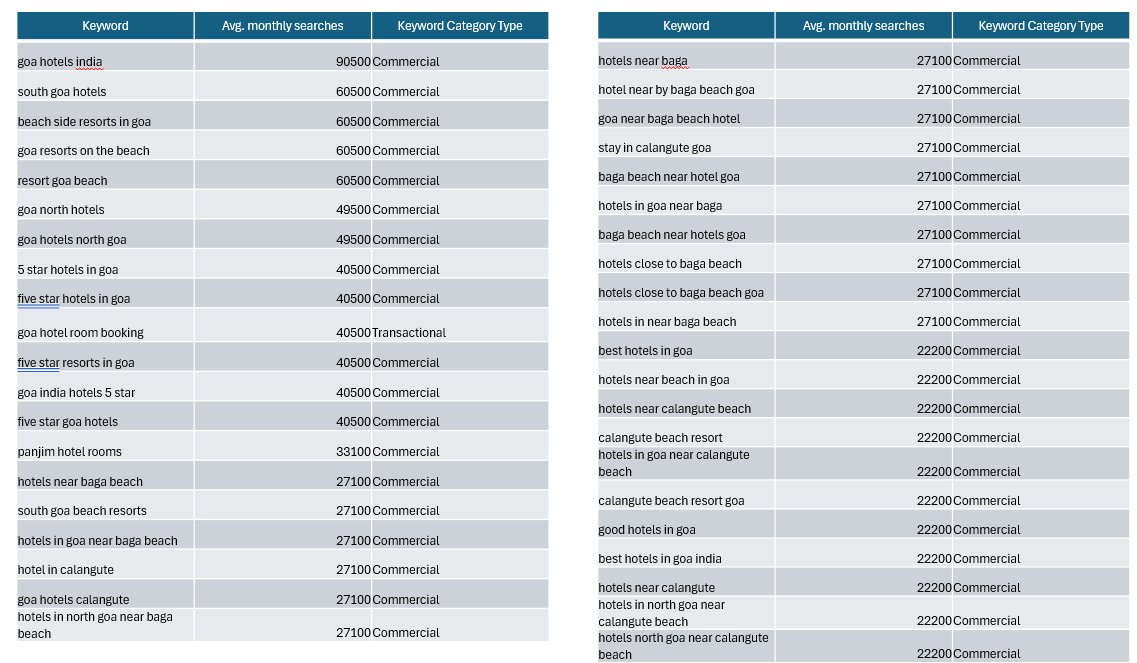
Education – Coaching, University
For the education sector, keywords should cover all stages of the user journey. Informational keywords like “how to prepare for NEET” or “best coaching for JEE in Delhi” work for awareness, while commercial keywords such as “top universities for MBA in India” or “best online coaching for CAT” target students actively considering options. Finally, transactional keywords like “apply for MBA at XYZ University” help convert high-intent prospects.
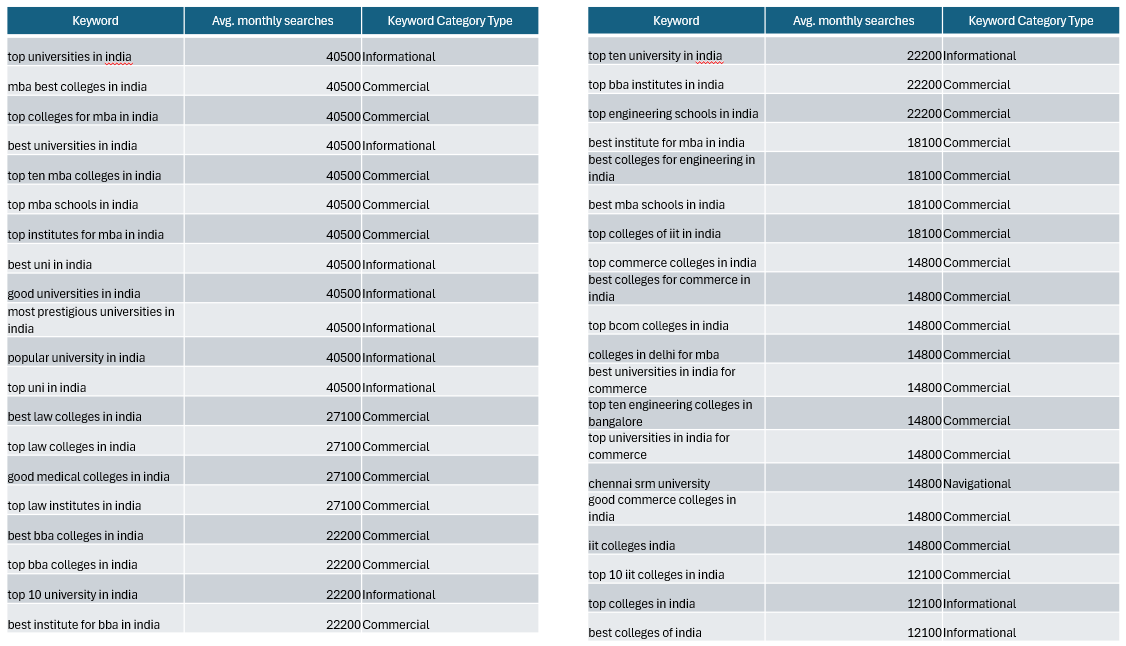
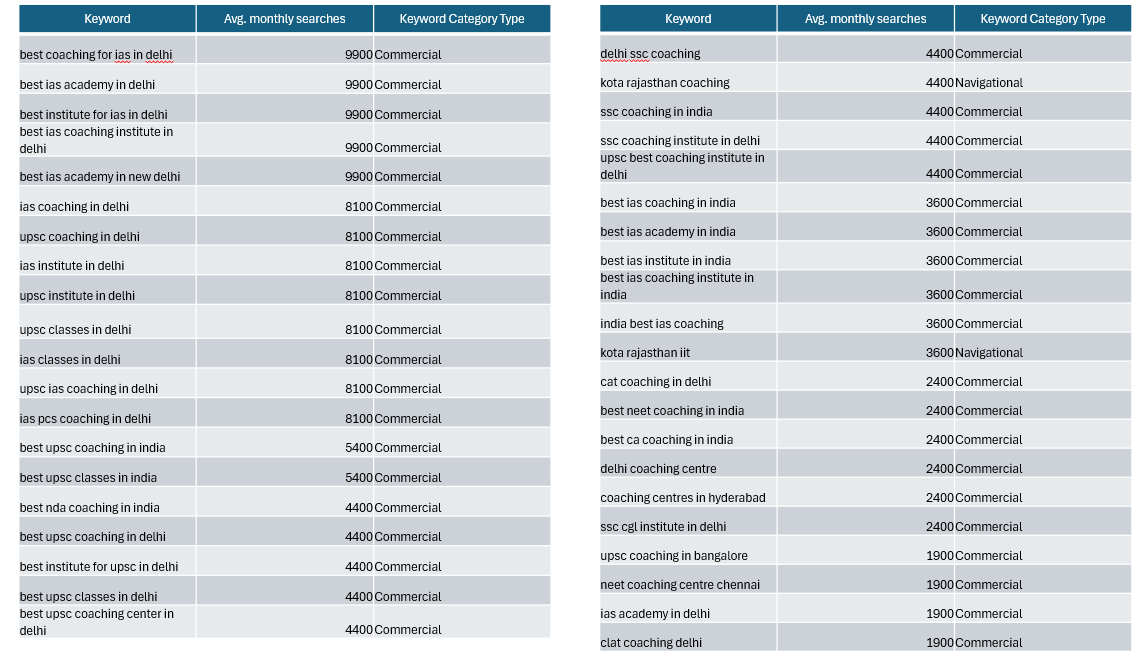
Clothing - Ethnic Wear
In ethnic wear, keywords with commercial and transactional intent perform best because shoppers often know what they want. Phrases like “buy bridal lehenga online”, “designer sarees for wedding”, or “affordable ethnic kurtis” work well. Including keywords related to festivals or occasions such as “Diwali ethnic wear” or “Eid special sarees” can capture seasonal purchase intent and boost conversions.
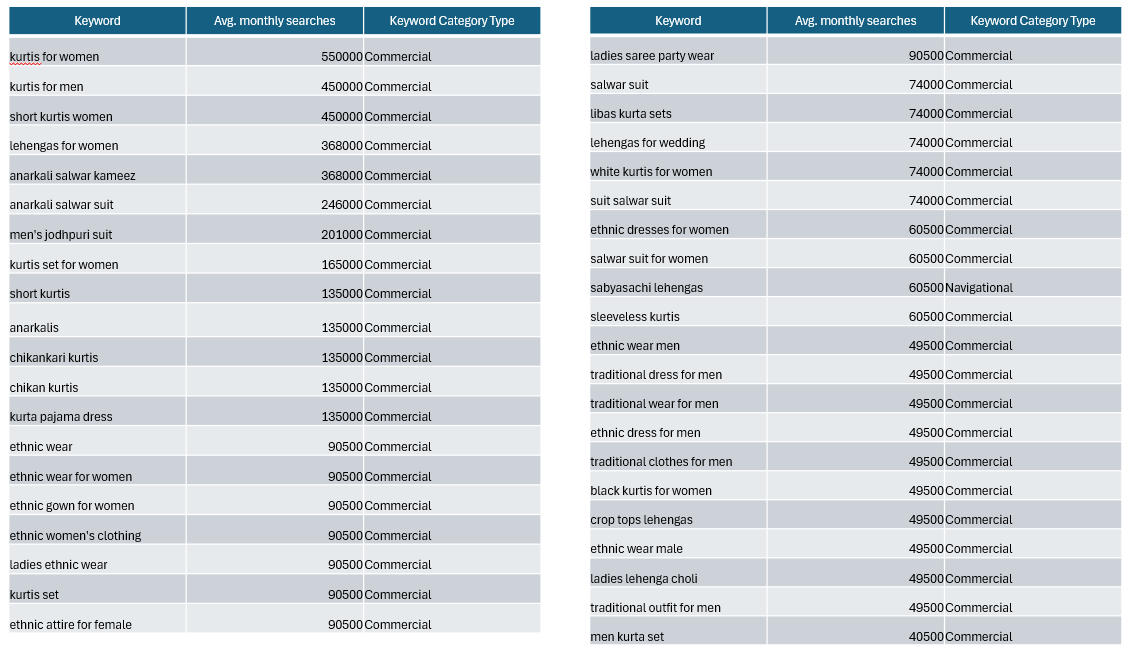
BFSI – Home Loan
For BFSI, especially home loans, informational and commercial keywords are critical because users research extensively before applying. Phrases like “home loan eligibility calculator”, “best home loan interest rates 2025”, or “compare home loans from banks” attract prospects who are in the consideration stage. At the decision stage, transactional keywords like “apply for home loan online” are essential to capture ready-to-convert customers.
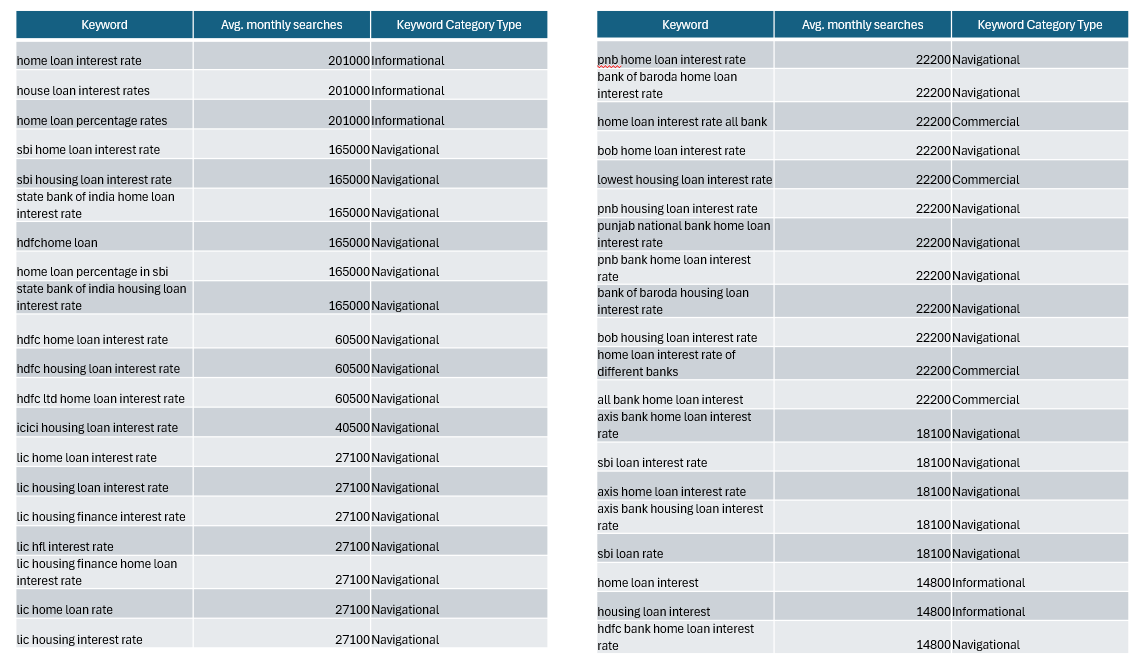
Final Thoughts
Finding good keywords for your AdWords campaign is not about guessing what people might search for. It is about understanding user intent, aligning it with your business goals, and continuously optimizing based on data.
When you choose the right keywords, you do more than just bring traffic. You bring the right audience, improve your Quality Score, lower costs, and ultimately drive maximum ROI.
So take the time to research, analyze, and refine your keywords. Because in the world of AdWords, keywords are the bridge between your business and your customers.
